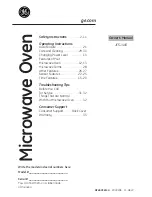
Consumer S
uppor
t
Tr
oubleshooting Tips
Operating Instructions
Safety Instructions
Usage situations where appliance’s power cord will be
disconnected infrequently.
Because of potential safety
hazards under certain conditions,
we strongly recommend against
the use of an adapter plug.
However,
if you still elect to use an adapter,
where local codes permit,
a
TEMPORARY CONNECTION
may
be made to a properly grounded
2-prong wall receptacle by the use
of a UL-listed adapter which is
available at most local hardware stores.
The larger slot in the adapter must be aligned with the larger slot in
the wall receptacle to provide proper polarity in the connection of the
power cord.
CAUTION:
Attaching the adapter ground terminal
to the wall receptacle cover screw does not ground the appliance
unless the cover screw is metal and not insulated, and the wall
receptacle is grounded through the house wiring.
You should have the circuit checked by a qualified electrician to make
sure the receptacle is properly grounded.
When disconnecting the power cord from the adapter, always hold
the adapter with one hand. If this is not done, the adapter ground
terminal is very likely to break with repeated use. Should this happen,
DO NOT USE
the appliance until a proper ground has again been
established.
Usage situations where appliance’s power cord will be
disconnected frequently.
Do not use an adapter plug
in these situations because frequent
disconnection of the power cord places undue strain on the adapter
and leads to eventual failure of the adapter ground terminal. You
should have the 2-prong wall receptacle replaced with a 3-prong
(grounding) receptacle by a qualified electrician before using the
appliance.
ADAPTER PLUGS
9
Ensure proper ground
and firm connection
before use.
TEMPORARY
METHOD
Align large
prongs/slots
(Adapter plugs not
permitted in Canada)
SAVE THESE INSTRUCTIONS
IMPORTANT SAFETY INFORMATION.
ge.com










































